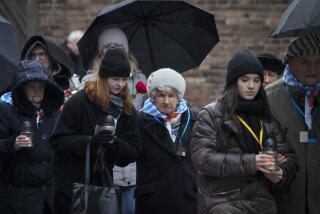Jan Karski; One of First Eyewitnesses to Report on Holocaust to Allied Leaders
- Share via
When Jan Karski undertook the mission that would forever blacken his view of humanity, his sponsors had the foresight to apologize.
“We are sorry,” they told the 28-year-old courier for the Polish underground during World War II, “that you will have to take such memories as these with you throughout your life.”
His assignment had come from Jewish resistance leaders desperate for Karski to be their emissary to the West. His job: to convey to Allied leaders his eyewitness account of the slaughter of Jews in Europe.
In late 1942, smuggled into the Warsaw ghetto, the Nazi transit camp in Izbica and the Belzec death camp, Karski, a Catholic, absorbed a terrible message. He was stunned by the sight of trains full of Jews, huddled, forlorn and bound for extermination. “A quivering cargo of flesh,” he would later say. Peeking through slats of a window blind, he saw Nazi soldiers shoot elderly Jews for sport.
Though he succeeded in sharing his excruciating observations with Western leaders, he fell painfully short of his goal. The leaders, in essence, shrugged at his news. The slaughter continued.
And, just as his comrades had warned, Karski, who was 86 at his death Thursday of heart and kidney disease at Washington’s Georgetown University Hospital, would carry the images of the Jews’ suffering into his old age. He would have it no other way.
“This sin,” Karski once told a gathering of Holocaust liberators, “will haunt humanity to the end of time. It does haunt me. And I want it to be so.”
Karski was one of the first eyewitnesses to report on the Holocaust to Allied leaders. He brought his account to a wider audience in “Story of a Secret State,” a book that appeared in the United States in 1944 and became a bestseller.
Then Karski was forgotten for the next four decades, in large part because of self-imposed silence on the subject, a reaction born of his disgust at the West’s inaction, and his own feeling of failure.
“While there were many witnesses to the tragic events of the Holocaust, Jan Karski was one of the few who did something about it,” said Rabbi Marvin Hier, dean and founder of the Simon Wiesenthal Center, which twice honored Karski. “Not only did he risk his life to come West and tell his story, but he would not rest until he had knocked on every door. If there had been more people like him, the course of history may well have been altered.”
Born Jan Kozielewski, he grew up in a large, devout Catholic family in the Polish city of Lodz. In 1935 he joined the Polish diplomatic corps and was an artillery officer in the September 1939 campaign against the Nazis. But his diplomatic career was derailed when he was taken prisoner by the Red Army after the Soviets invaded Poland a few weeks later. He escaped to join the underground.
Because of his photographic memory and bravery (his nickname was Piorin, Polish for lightning bolt), he was made a courier between the underground and the Polish government in exile. Between 1939 and 1943, he would cross enemy lines four times.
On one of his last trips, he was twice smuggled through the sewers into the Warsaw ghetto, where he witnessed the murder of elderly Jews. Later, disguised as an Estonian guard, he was admitted to the death camp at Belzec, where the grounds were strewn with the weakened bodies of Jews crazed by hunger.
“[The] Jewish mass vibrated, trembled, and moved to and fro as if united in a single, insane, rhythmic trance,” he wrote. “They waved their hands, shouted, quarreled, cursed, and spat at each other. Hunger, thirst, fear, and exhaustion had driven them all insane.”
He saw Jews packed into rail cars that were coated on the floors with quicklime, sealed and moved a short distance away. After a few days, the cars were opened, the dead Jews burned, and a new layer of quicklime laid down for the next load.
Twice captured, Karski slit his wrists in a vain attempt to escape torture. Although under heavy guard in the hospital, he managed through a priest to contact the Polish underground, escaping naked through an open window in a daring rescue by comrades.
Then, in 1943, out of what he later called “pure duty,” he met with President Franklin D. Roosevelt, British Foreign Minister Anthony Eden and American Jewish leaders, including Supreme Court Justice Felix Frankfurter, and told them of the horrors he had seen.
But his reports were met with indifference. “Tell your nation we shall win the war,” Roosevelt told Karski, avoiding mention of the Jews’ plight. After a long evening conversation with Frankfurter, the jurist, who made a point of telling Karski that he was a Jew, said, “I cannot believe you.”
Unable to return to Poland because of the personal risks he had taken, he wrote a book and gave more than 200 speeches, always addressing “the Jewish tragedy.”
He had wanted to save the Jews and to save Poland as well. He felt he had failed utterly.
After the war, he settled in the United States, became a citizen, earned a doctorate in government and taught at Georgetown University. He married Pola Nirenska, a concert dancer who was a Polish Jew. Embittered by the futility of his wartime mission, he vowed never to speak of it again.
For the next few decades, he mostly kept his promise. Although his popular Georgetown classes were littered with references to the times “the Russians broke these ribs” or, pointing to his other side, the time “the Nazis broke these ribs,” he did not let on to his students that he had been a player in a monumental drama.
In 1981, Elie Wiesel, the Holocaust survivor who would later earn the Nobel Peace Prize for his efforts to preserve the record of Nazi atrocities, coaxed Karski out of his silence. Karski agreed to speak at an international conference of Holocaust liberators in Washington, where he received an ovation. He was featured in “Shoah,” an eloquent 1985 documentary on the Holocaust in which Karski was seen as the hero.
In 1994, when he turned 80, he was made an honorary citizen of Israel. “Now, I, Jan Karski . . . a Pole, an American, a Catholic, have also become an Israelite! Gloria,” he said at the ceremony, “Gloria in excelsis Deo.”
More to Read
Sign up for Essential California
The most important California stories and recommendations in your inbox every morning.
You may occasionally receive promotional content from the Los Angeles Times.











